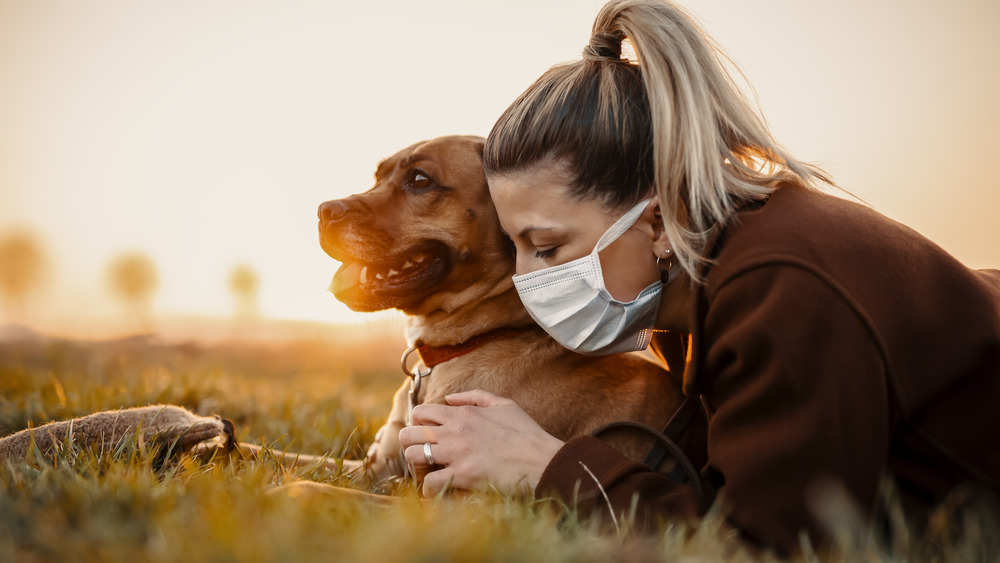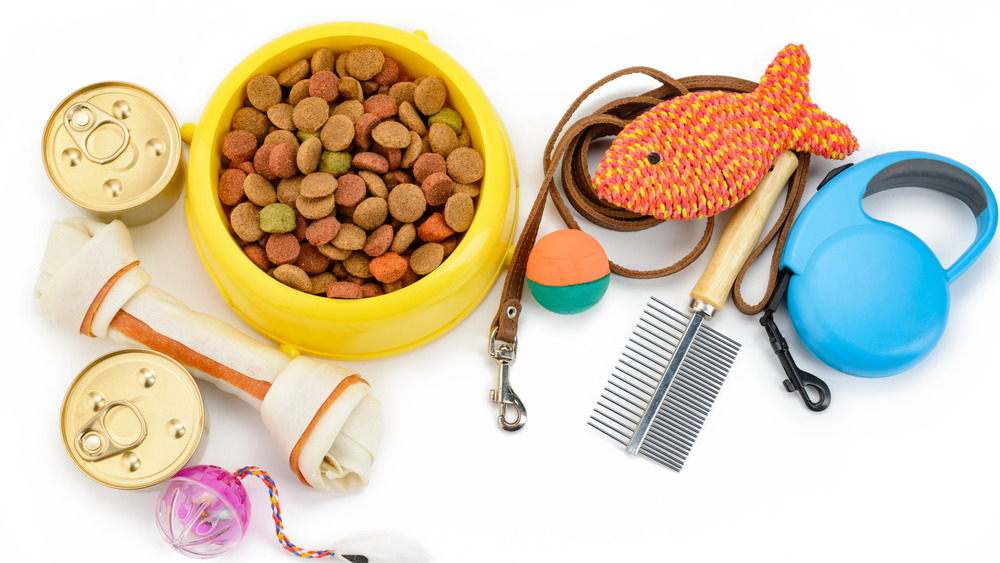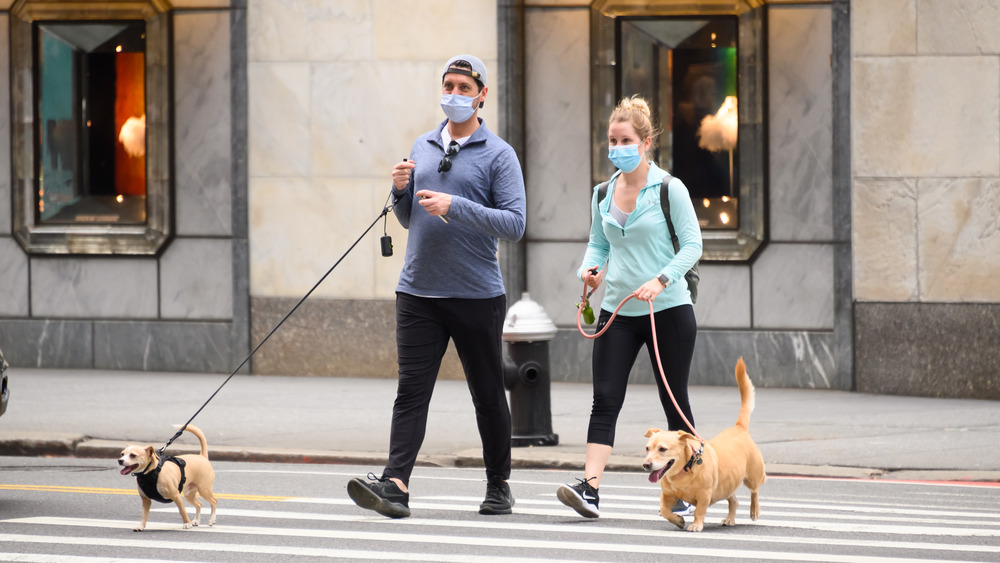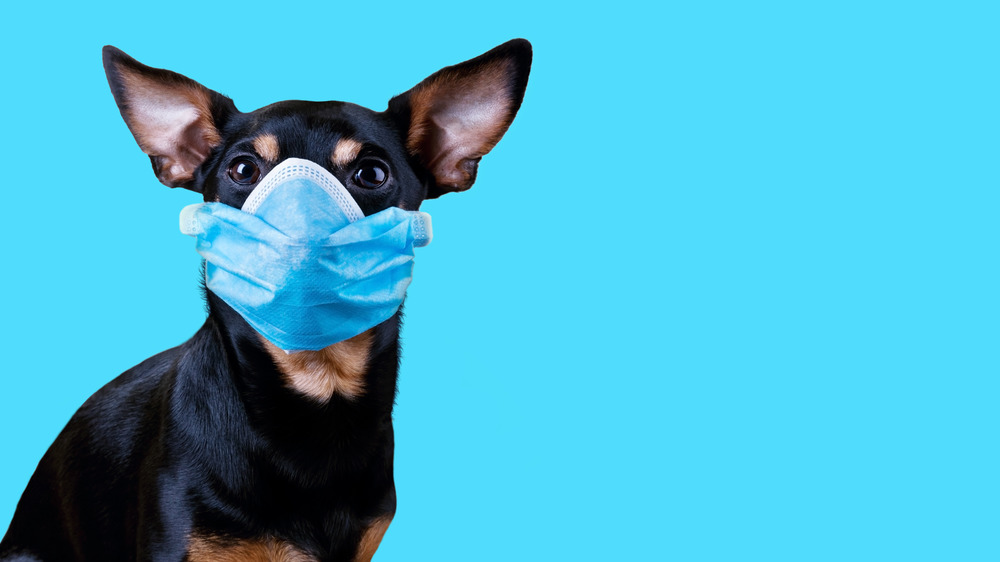How To Care For Your Pets If You Have COVID-19
It's been nearly a year now that we've all been living with the threat of a pandemic hanging over our heads, and as the tension mounts, many of us are finding solace in our beloved fur friends. Pets are great at relieving our stress, after all, and they give us needed cuddles and contact at a time when many of us have been kept from friends and family. As USA Today reported back at the beginning of the pandemic, quarantine season did have one silver lining in that the numbers of pet adoptions went through the roof. Plus, dog rescue might become even more popular now that first dogs-elect Major and Champ will soon be occupying the White House!
Now that so many of us are petted up (and for the millions of us who were already sharing our lives with animal companions), it's time to take a good look at planning what to do in a worst-case scenario. Even with vaccines on the horizon, the danger of becoming infected with coronavirus is still just as high as ever, and VCA Animal Hospitals want to make sure every pet owner is prepared to take care of their pets in the event a crisis occurs.
Stock up on pet supplies
Remember back in spring, when grocery shopping was akin to competing in The Hunger Games and people were prepared to throw down over toilet paper like it was the last half-price big screen TV on Black Friday? Well, there's no need to run amok through the aisles of Petco — or Costco, also a stellar place to shop for pet supplies — but you'd best make a trip to stock up or stay home and order online while you're still in shape to do so. After all, if you become infected, you shouldn't be leaving the house, and you might be feeling too lousy even to haul in a few bags of dog food off the front porch.
What VCA recommends that you have on hand is at least a one-month supply of your preferred pet food (and treats!), as well as any medications your pet will need — oh, and some pet toys, since your pet may get bored, too. And since even a Very Good Boy (or Girl) may have an accident if you're too sick to take them out as often as needed, you may need some cleaning supplies as well. Potty pads might even be a good idea, or kitty litter if you've got a cat. No hand sanitizer, however, or not for the pets, at least. Still might want to pick some up for yourself.
Enlist help, if possible
VCA recommends that, if all possible, you enlist someone else living in your home to help with your pet care needs should you become infected with the coronavirus. They acknowledge that not everybody has such helpful household members (or any at all), however, so they also offer some advice for those who must go it alone. They say that you should try to keep your germs away from your pet since, even though it's uncommon for animals to come down with coronavirus, it's not entirely unknown, and your pet deserves to stay as safe as anyone else with whom you might come into contact.
How you can limit your pet's germ exposure is by washing your hands before and after touching or feeding them, coughing or sneezing into your elbow or a tissue (which you dispose of in a garbage can they can't raid), and — so sad! — limiting any kissing or snuggling you may do. You're also advised not to share food with your pet, even when they give you those sad "puppy dog" eyes, and you should also try to keep them out of your bed while you are ill. If keeping 6 feet of distance between you and your best buddy sounds impossible, then you could at least try wearing a mask while you're at home (as well as when you're out, of course).
Keep your pet safe even if you're not ill
This could potentially be an unsafe time for pets as well as people, at least until we get COVID-19 under control. Even if you're lucky enough to be virus-free, you should still be taking all necessary precautions to protect yourself and others whenever you go out of the house, and this goes for your pets, too. Whether they are potential spreaders of the virus or may even run the risk of contracting it themselves, there are certain measures you can take to decrease the likelihood of them coming into contact with the disease.
The VCA advises that pets, like people, keep to their COVID bubbles, those being limited to the people and other pets with whom they live. Cats should be kept inside, so nail up that cat flap. Dogs still need to go out for obvious reasons, but should only be walked on a leash (or kept in a fenced yard) while maintaining at least 6 feet between dogs as well as people. Doggie parks are out for the present, since even though they're outdoors, it's impossible to explain to dogs that they must maintain an appropriate social distance from one another. Sad, but necessary, which is pretty much applies to just about everything else we've done this year.
Let's just hope that things will be different in 2021 so our best buddies can get back to butt-sniffing and whatever it is cats, ferrets, and lizards do for fun.




